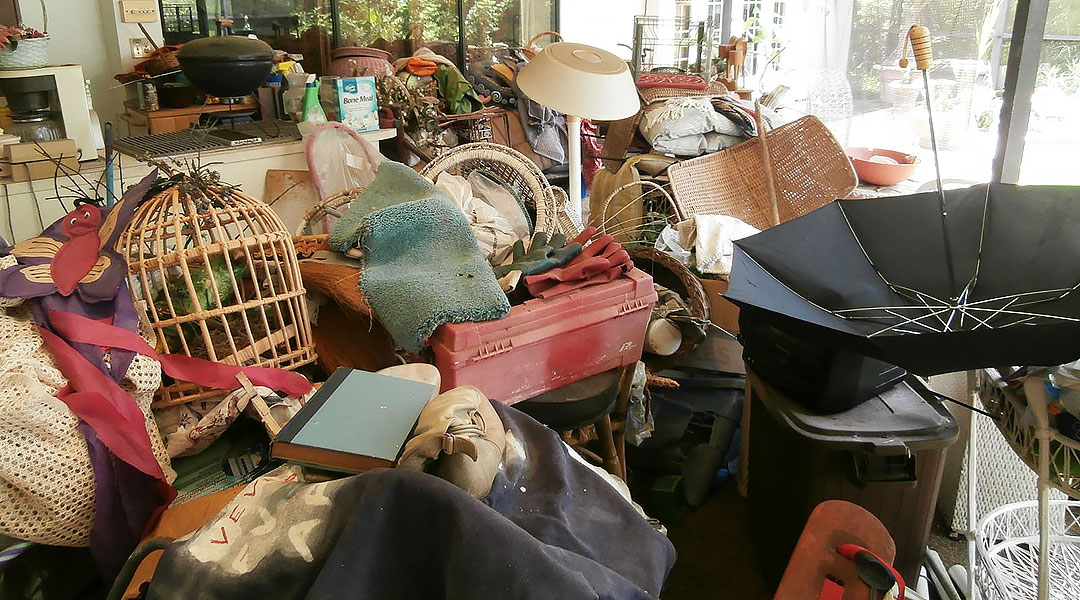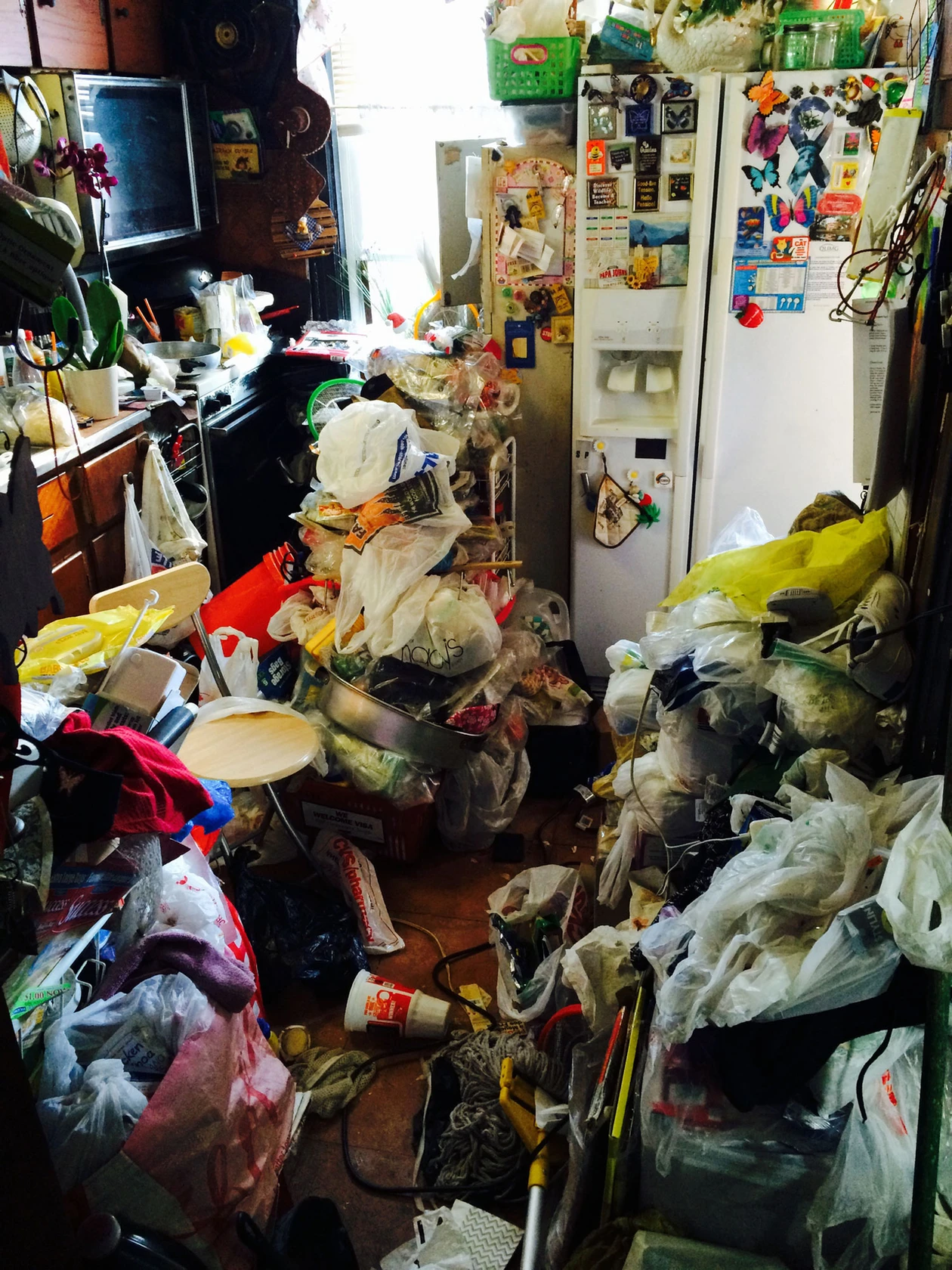Columbia has a large number of hoarders compared to the rest of the state. But the city might not have enough resources to offer the necessary support. (Photo courtesy of Spaulding Decon)
More calls about hoarding concerns are placed from Columbia than any other city in South Carolina, according to Denisha Holloway of the national cleaning company Steri-Clean.
Steri-Clean is the company founded by Corey Chalmers, creator of the “Hoarders” TV show.
Local safety officials back up Holloway’s assessment.
Between 30% and 40% of house fires in Columbia are at homes with “an unusual stockpiling of stuff,” which leads to safety issues, said Christopher Kip, the Columbia Fire Department’s assistant chief of operations.
Hoarding cases most frequently involve the collection of large amounts of antiques or trash, Holloway said. They also often come with biohazards including microbial growths, animal feces and drug needles.
“There’s such a dense population in Columbia that I’m telling you, you can ride down the road and tell someone is hoarding just from the outside of their home,” Holloway said.
Even with a high volume of cases, there aren’t many support services for people affected by hoarding disorder in the area, said professionals and experts in the field.
Hoarding is recognized as an official mental disorder. People suffering from the disorder experience an impulse to save items because they believe they will need them for future use and experience distress when parting with items, according to the American Psychiatric Association.
Julie Lundy, a Columbia psychologist who specializes in hoarding, said she receives between 15 and 25 calls per month from Columbia residents seeking help for family members or, less often, themselves.
There doesn’t seem to be many other psychologists in the area who specialize in hoarding, Lundy said. One reason is the nature of the job.
“Some people don’t like the clutter or some of the grosser things that you might see,” she said. “It has to be something that you have a desire or passion to be a part of.”
Much of the support that is available to Columbia residents affected by hoarding disorder is offered through cleaning services in the area.
Emergency cleaning company Spaulding Decon’s Columbia branch is working to bring compassion and support to hoarders, said Tangalen Sutton. She serves as the marketing director for the branch but has a background in mental health.
“Hoarding cleanup is very difficult because oftentimes you have individuals that maybe have depression or lack coping skills,” Sutton said. “Maybe they’ve given up on life after the death of a loved one.”
One client’s home in West Columbia contained so much filth and clutter that it developed an insect problem, Sutton said.
“It was extensive hoarding to the point of roaches coming out of cabinets, dead in the fridge, (and) just clothes and trash everywhere,” she said.
Roaches were also in food still on the table.
The client had recently lost his spouse. The trauma of the loss led to the development of the man’s hoarding tendencies, Sutton said.
Another Columbia resident, Ed, who exhibited hoarding tendencies, recently passed away. Chance Connolly, the man’s neighbor and a junior social work major at the University of South Carolina, helped clear out Ed’s house after his passing.
Connolly said he often shared long talks with Ed but had never been inside his home. He said he was surprised at the amount of items and lack of upkeep when he first entered the house. There was a large collection of books, music and history-related items.
One room contained so many items a path had to be cleared and Chance said he had to watch his step.
He said there was a buildup of boxes filled with miscellaneous items and “anything from an old … vacuum from like the 50s to broken wicker furniture and everything in between.”
Columbia’s fire department is often the first to identify hoarding situations in the area. It hopes to support those affected by handling the situations delicately and connecting people with social workers.
“We take care of the immediate emergency, but there’s often a more complex situation that we don’t have the resources for,” Kip said.
It’s important that hoarders find guidance in professionals or other trusted individuals, Lundy said.
“People are harsh on hoarders…” she said. “If they felt really supported and cared for by their support system, I think that would really benefit and help with their recovery.”
A hoarder living in Boston, Massachusetts, who asked to be called “Susie” because of the stigma attached to hoarding, said a strong foundation of support is what helped to change her mindset.
Susie volunteered to share her experiences after answering a message board post from the Carolina News & Reporter.
Her decision to seek help for her hoarding habits came when she realized how much money she was spending on a storage space packed “top to bottom, front to back.”
“I just decided, I don’t know, that I had too much stuff,” Susie said. “And I just couldn’t keep living like that.”
Susie joined the Hoarding Cleanup message board soon after that revelation. She said the support of the online group was the biggest source of guidance on her cleaning journey.
She cleared roughly 20 boxes of books from her home and worked to stop hoarding items such as clothing and linens.
She said her house has been “de-hoarded” since 2018.
“Whether it’s online or, wherever it is, you need a supportive community,” Susie said. “Because, I mean, there were days where I’d hate myself for abusing the ability to own stuff.”
But there are a limited number of group-based therapy options or support groups in Columbia.
Lundy started a South Carolina hoarding and clutter support group on Facebook several years ago. But the pandemic caused the page to become inactive.
Steri-Clean’s Holloway said hoarders most often slip back into old habits when they lose the help of others.
“It just breaks your heart sometimes,” she said.
Lundy hopes to revitalize the Facebook support group sometime soon.
The most common items found in Columbia hoarding cases include piles of trash and antiques, said Holloway. She’s never seen an animal hoarding case in Columbia, although the extreme collection of dogs and cats is very common in other places. (Photo courtesy of Steri-Clean South Carolina.)
Spaulding and Decon is an emergency cleanup company that handles many hoarding cases. The company’s marketing director Tangelan Sutton described a case where the client couldn’t cook, sleep in their bed, or pass easily through doorways because of the build up of trash and clutter. The only free surface was a spot on the couch cleared to watch TV. (Photo Courtesy of Spaulding Decon)




